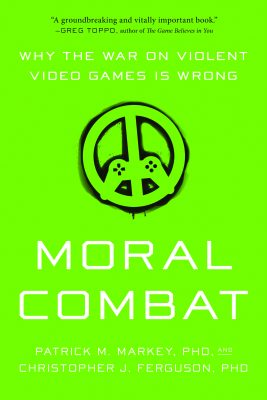Moral Combat and the War on Violent Video Games


Chris Ferguson, Ph.D., is at it again.
Ferguson, a professor of psychology, has written more than 100 book chapters and journal articles as part of his research on the effects of violent video games. Notably, he also has participated in talks given by former Vice President Joe Biden’s task force on gun control following the 2012 Sandy Hook shooting, as well as in hearings for the Institute of Medicine on the role of media violence in gun violence a year later.
Now, he has co-authored “Moral Combat – Why the War on Violent Video Games is Wrong,” collaborating with Patrick M. Markey, Ph.D., a professor of psychology and director of the Interpersonal Research Laboratory at Villanova University.
The 256-page book, published by BenBella Books Inc., will be released Tuesday, March 21.
The book’s promotional materials begin: “‘Boom! Headshot!’ In family rooms all across America, millions of children and teenagers are enjoying violent video games. Popular games like Call of Duty, Halo and Grand Theft Auto place players in elaborate fictional worlds – often with a gun in their hands.
 “The media and the government are quick to point fingers when it comes to young perpetrators of violence,” the materials continue. “If it becomes apparent that school shooters, for instance, may have enjoyed violent games at some point—well, those games were clearly the culprit or at least a warning sign, right? But the problem with this conclusion is that it’s not based on facts. Here’s what they’re not telling you: Only a small minority of school shooters played violent video games.”
“The media and the government are quick to point fingers when it comes to young perpetrators of violence,” the materials continue. “If it becomes apparent that school shooters, for instance, may have enjoyed violent games at some point—well, those games were clearly the culprit or at least a warning sign, right? But the problem with this conclusion is that it’s not based on facts. Here’s what they’re not telling you: Only a small minority of school shooters played violent video games.”
“Moral Combat” contends that the media and commentators aren’t giving you the whole story, and the authors believe it’s time for a new conversation about these games and their role in children’s lives. Ferguson and Markey explore how video games, including those considered violent, actually have a positive social impact for today’s youth, and they offer a comprehensive overview of their history, culture and scientific research.
One finding: Countries in which video games are extremely popular have lower levels of homicides and violent assaults than countries in which people play fewer video games. Another finding: Contrary to the stereotype of video gamers as introverts who isolate themselves in their parents’ basements, more than 70 percent of gamers play with friends.
Ferguson and Markey, on the frontline of the violent video game debate for years, write to “debunk the stark picture media, politicians and other personalities tend to paint in order to sway public opinion about the impact of gaming.”


